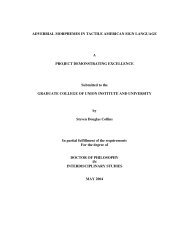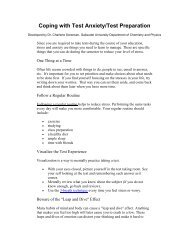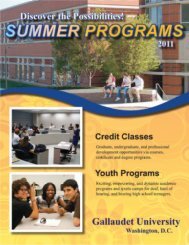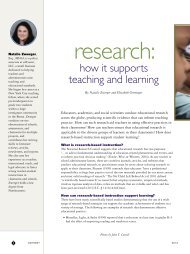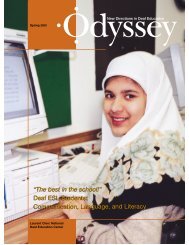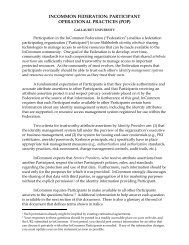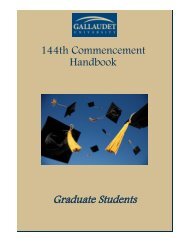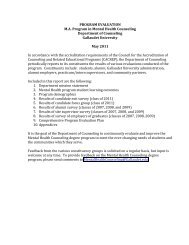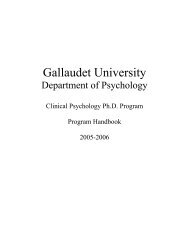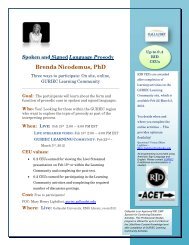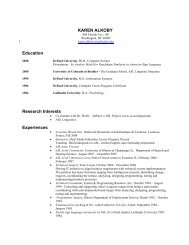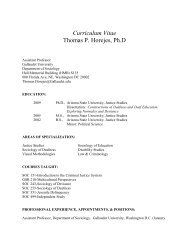FY 2008 Annual Report of Achievements - Gallaudet University
FY 2008 Annual Report of Achievements - Gallaudet University
FY 2008 Annual Report of Achievements - Gallaudet University
You also want an ePaper? Increase the reach of your titles
YUMPU automatically turns print PDFs into web optimized ePapers that Google loves.
A-120<br />
• collect, manage, and think about their work and what it means for today and the future<br />
• interact with data about themselves over an extended period <strong>of</strong> time<br />
• analyze and assess their own progress through reflection<br />
• plan and manage their time to complete the work<br />
• receive and use feedback<br />
• make decisions about future goals based on evidence and criteria<br />
Development<br />
Prior years. In <strong>FY</strong> 1998, portfolios began on the senior team at MSSD. The five outcomes were<br />
established, and senior portfolios began including an end-<strong>of</strong>-year senior presentation. Portfolios soon<br />
expanded into the second semester for seniors. Students received a grade for senior lab, and senior<br />
presentations included external panel members as graders. In <strong>FY</strong> 2000, portfolios expanded to a full year<br />
for seniors, and the senior project was piloted. The senior project provides students with the opportunity<br />
to pursue and manage a year-long project <strong>of</strong> their choosing. Throughout their senior project experience,<br />
students are challenged to manage short- and long-range timelines, identify and locate needed resources,<br />
and synthesize information from various sources. Portfolios were approved as a graduation requirement<br />
in <strong>FY</strong> 2001, and in this same year the process was trialed on Team 1/2/3 through Team 11. Standard<br />
portfolio requirements were implemented on teams 9–12 in <strong>FY</strong> 2002, and the initial exploration <strong>of</strong><br />
freshman introductory curriculum began. An educator’s guide for the now formally titled Portfolios for<br />
Student Growth was completed in <strong>FY</strong> 2004 along with a PSG training presentation.<br />
Much work took place in <strong>FY</strong> 2005. Activities included differentiation <strong>of</strong> student materials to<br />
address the individual needs <strong>of</strong> high school students, development <strong>of</strong> a one-day PSG overview training,<br />
and drafting <strong>of</strong> the PSG Foundations curriculum. The Foundations curriculum was developed to teach<br />
new students the knowledge and skills needed for high school success and portfolio development and to<br />
understand the KDES/MSSD student outcomes.<br />
Additional PSG work completed in <strong>FY</strong> 2005 was the creation <strong>of</strong> a senior project guide to<br />
provide advisors and students with information about all aspects <strong>of</strong> the senior project, including specific<br />
requirements and suggestions for successful completion. Work to standardize PSG implementation at<br />
KDES and make it consistent with student outcomes was also initiated.<br />
During <strong>FY</strong> 2006, the program focused attention on piloting elementary and middle school PSG<br />
processes and materials at KDES. Investigators completed a draft version <strong>of</strong> the elementary educator’s<br />
guide, and early childhood and middle school processes were designed, implemented, and reviewed.<br />
Revision <strong>of</strong> these processes and development <strong>of</strong> processes for early and upper elementary grades<br />
continued through <strong>FY</strong> 2007. High school materials were further refined and developed to meet ongoing<br />
program and student needs. The introductory Foundations curriculum, revised in <strong>FY</strong> 2006, was shared<br />
with other schools using PSG and will be further refined based on their feedback. The senior project<br />
guide, developed in <strong>FY</strong> 2005, was put into routine use at MSSD. During <strong>FY</strong> 2006, the one-day PSG<br />
overview training was revised and a two-day PSG intensive workshop was developed and piloted.<br />
During <strong>FY</strong> 2007 two new PSG workshops were developed and piloted, one for educators<br />
working with students who have disabilities and the other for families who would like to develop family<br />
portfolios at home. These workshops are now routinely <strong>of</strong>fered by Clerc Center trainers. These, in<br />
addition to PSG trainings for educators, continue to be popular Clerc Center <strong>of</strong>ferings. PSG product<br />
planning continued during <strong>FY</strong> 2007. The Web site was updated to include the elementary educator’s<br />
guide and other support materials. PSG implementation continued at KDES and MSSD in <strong>FY</strong> 2007 as<br />
part <strong>of</strong> standard school programming.<br />
<strong>FY</strong> <strong>2008</strong> activities and/or product(s).<br />
• The PSG Web site was updated.



